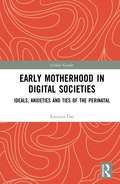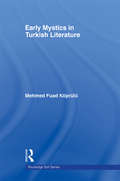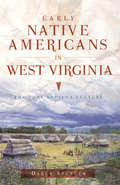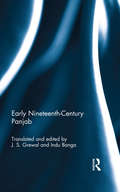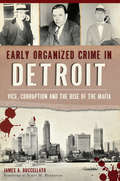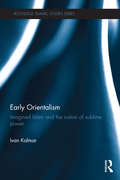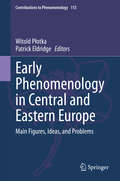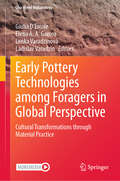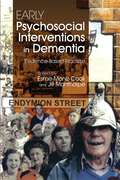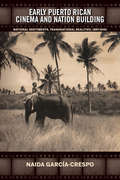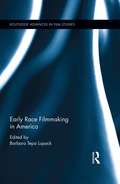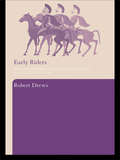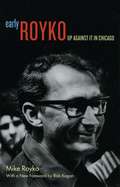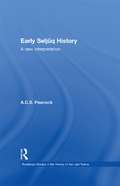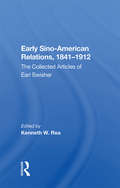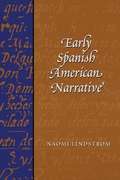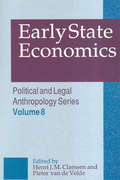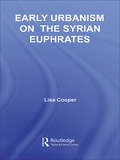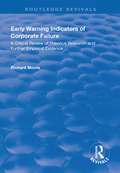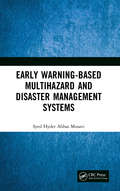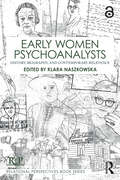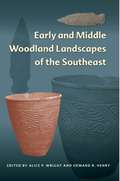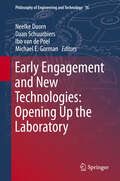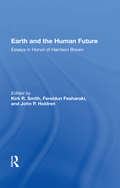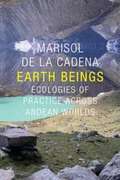- Table View
- List View
Early Motherhood in Digital Societies: Ideals, Anxieties and Ties of the Perinatal (Global Gender)
by Ranjana DasEarly Motherhood in Digital Societies offers a nuanced understanding of what the digital turn has meant for new mothers in an intense and critical period before and after they have a baby, often called the ‘perinatal’ period. The book looks at an array of digital communication and content by drawing on an extensive research project involving in-depth qualitative data from interviews with new mothers in the United Kingdom and online case studies. These stories are analysed to investigate the complexity of emotions around birth, the diversity of birth experiences and the myriad ways in which television, the press and social media impede and empower women giving birth. The book asks: what does the use of technology mean in the perinatal context and what implications might it have for maternal well-being? It argues for a balanced and context-sensitive approach to the digital for maternal well-being in the critical perinatal period. By doing this, the book fills a gap in media studies, addressing itself to gaps within audience analysis, health communication and parenting. It will be essential reading for research and teaching modules in media studies, cultural studies, sociology, health communication and sociology of medicine and health.
Early Mystics in Turkish Literature (Routledge Sufi Series)
by Mehmed Fuad KopruluThis book is a translation of one of the most important Turkish scholarly works of the twentieth century. It was the masterpiece of M.F. Koprulu, one of Turkey’s leading, and most prolific, intellectuals and scholars. Using a wide variety of Arabic, and especially Turkish and Persian sources, this book sheds light on the early development of Turkish literature and attempts to show the continuity in this development between the Turks and that of Anatolia. Early Mystics in Turkish Literature addresses this topic within the context of other subjects, including Sufism, Islam and the genesis of Turkish culture in the Muslim world. This is a major contribution to the study of Turkish literature and is essential reading for scholars of Turkish literature, Islam, Sufism and Turkish history.
Early Native Americans in West Virginia: The Fort Ancient Culture (American Heritage)
by Darla SpencerOnce thought of as Indian hunting grounds with no permanent inhabitants, West Virginia is teeming with evidence of a thriving early native population. Today's farmers can hardly plow their fields without uncovering ancient artifacts, evidence of at least ten thousand years of occupation. Members of the Fort Ancient culture resided along the rich bottomlands of southern West Virginia during the Late Prehistoric and Protohistoric periods. Lost to time and rediscovered in the 1880s, Fort Ancient sites dot the West Virginia landscape. This volume explores sixteen of these sites, including Buffalo, Logan and Orchard. Archaeologist Darla Spencer excavates the fascinating lives of some of the Mountain State's earliest inhabitants in search of who these people were, what languages they spoke and who their descendants may be.
Early Nineteenth-Century Panjab
by J. S. Grewal Indu BangaThe Chār Bāgh-i-Panjāb, written by Ganesh Das Wadera immediately after the annexation of the Lahore kingdom by the British in 1849, is a classic Persian text. Its long descriptive part is the only surviving account of the social, religious, and cultural life of the peoples of the Punjab, especially during the late-eighteenth and the early-nineteenth century. Ganesh Das writes about traditional learning, literature, folklore, urban centres, and women with a rare catholicity as an Indian, an orthodox Hindu, a Punjabi, and a Khatri. Himself a hereditary qanungo of Gujrat in the Sikh kingdom, he also provides valuable insights into the structure of revenue administration at lower rungs. This volume presents an authoritative English translation of this primary descriptive section of Chār Bāgh-i-Panjāb, with a detailed Introduction, critical commentary, glossary, map, and a classified index. Indispensable for researchers, it will interest historians of medieval and modern India, especially those concerned with the pre-Independence Punjab region.
Early Organized Crime in Detroit: Vice, Corruption and the Rise of the Mafia (True Crime)
by James BuccellatoThough detectives denied it, the Italian mafia was operating in Detroit as early as 1900, and the city was forever changed. Bootleggers controlled the Detroit River and created a national distribution network for illegal booze during Prohibition. Gangsters, cops and even celebrities fell victim to the violence. Some politicians and prominent businessmen like Henry Ford's right-hand man, Harry Bennett, collaborated closely with the mafia, while others, such as popular radio host Gerald Buckley, fought back and lost their lives. Social scientist and crime writer James A. Buccellato explores Detroit's struggle with gang violence, public corruption and the politics of vice during the tumultuous first half of the twentieth century.
Early Orientalism: Imagined Islam and the Notion of Sublime Power (Routledge Islamic Studies Series)
by Ivan KalmarThe history of western notions about Islam is of obvious scholarly as well as popular interest today. This book investigates Christian images of the Muslim Middle East, focusing on the period from the Renaissance to the Enlightenment, when the nature of divine as well as human power was under particularly intense debate in the West. Ivan Kalmar explores how the controversial notion of submission to ultimate authority has in the western world been discussed with reference to Islam’s alleged recommendation to obey, unquestioningly, a merciless Allah in heaven and a despotic government on earth. He discusses how Abrahamic faiths – Christianity and Judaism as much as Islam – demand devotion to a sublime power, with the faith that this power loves and cares for us, a concept that brings with it the fear that, on the contrary, this power only toys with us for its own enjoyment. For such a power, Kalmar borrows Slavoj Zizek’s term "obscene father". He discusses how this describes exactly the western image of the Oriental despot - Allah in heaven, and the various sultans, emirs and ayatollahs on earth – and how these despotic personalities of imagined Muslim society function as a projection, from the West on to the Muslim Orient, of an existential anxiety about sublime power. Making accessible academic debates on the history of Christian perceptions of Islam and on Islam and the West, this book is an important addition to the existing literature in the areas of Islamic studies, religious history and philosophy.
Early Phenomenology in Central and Eastern Europe: Main Figures, Ideas, and Problems (Contributions to Phenomenology #113)
by Patrick Eldridge Witold PłotkaThis book presents the origins of Central and Eastern European phenomenology. It features chapters that explore the movement's development, its most important thinkers, and its theoretical and historical context. This collection examines such topics as the realism-idealism controversy, the status of descriptive psychology, the question of the phenomenological method, and the problem of the world.The chapters span the first decades of the development of phenomenology in Czechoslovakia, Poland, Romania, Russia, and Yugoslavia before World War II. The contributors track the Brentanian heritage of the development. They show how this tradition inspired influential thinkers like Celms, Špet, Ingarden, Frank, Twardowski, Patočka, and others. The book also puts forward original investigations. Moreover it elaborates new accounts of the foundations of phenomenology. While the volume begins with the Brentanian heritage, it situates phenomenology in a dialogue with other important schools of thought of that time, including the Prague School and Lvov-Warsaw School of Logic.This collection highlights thinkers whose writings have had only a limited reception outside their home countries due to political and historical circumstances. It will help readers gain a better understanding of how the phenomenological movement developed beyond its start in Germany. Readers will also come to see how the phenomenological method resonated in different countries and led to new philosophical developments in ontology, epistemology, psychology, philosophy of culture, and philosophy of religion.
Early Pottery Technologies among Foragers in Global Perspective: Cultural Transformations through Material Practice (One World Archaeology)
by Elena A. A. Garcea Giulia D’Ercole Lenka Varadzinová Ladislav VaradzinThis book presents up-to-date perspectives on pre-farming innovations through material practices, resource intensification, and emerging technologies, particularly pottery manufacture. It includes original studies on the earliest pottery productions among foragers from different parts of the world based on first-hand excavations and laboratory analyses. Its broad geographic scope includes Northern and Central Europe, Eastern Asia (different regions in China), Northern, Western, and Southern Africa, and southeastern North America, comprising parts of the world previously ignored (different regions in Africa) and extending beyond the Old World, i.e., North America. It also takes into account the differing chronologies of the emergence of pottery before food production, which are not limited to the late Pleistocene and early Holocene, but extend as late as the middle Holocene (e.g., in Southern Africa). This volume offers a fresh and still unexplored, global intercultural and interactive discussion on the emergence of pottery. By mapping the latest findings and variety of methodological approaches, it intends to capture both variability and common denominators of the cultural processes between the end of the Pleistocene and the early/mid-Holocene in which the production and use of pottery played a significant role among hunter-gatherers. This book is a fundamental contribution to the understanding of the role of material practices in cultural transformations in late prehistory worldwide and to the debate on how local narratives mirror different social identities, meanings, and/or functions depending on the specific economic context, settlement system, and cultural landscape. It emphasizes how transformative technologies can potentially create radical changes in the way human populations live and interact with each other. Ultimately, this volume contains valuable reflections and expectations for the future of worldwide pottery research among foragers.
Early Psychosocial Interventions in Dementia: Evidence-Based Practice
by Bob Woods Linda Clare Jill Manthorpe Esme Moniz-Cook Suzanne Cahill Irene Carr Richard Cheston Steffi Urbas Inge Cantegreil-Kallen Rose-Marie Droes Hilary Husband Rabih Chattat Myrra Vernooij-Dassen Georgina Charlesworth Manuel Franco Molly BurnhamFor the increasing number of people diagnosed with dementia each year, treatment in the early stages can make a significant difference to their quality of life. This book provides examples of psychosocial interventions: taking into consideration the individual, social and environmental aspects of the person's life. It looks at ways of providing support at the time of diagnosis and goes on to explore a variety of interventions and services for the treatment of early dementia. Bringing together the knowledge and experiences of professionals from both the UK and Europe, the contributors describe interventions for both psychological and practical problems with case examples such as memory support groups, art therapies and assistive technologies for use in the home. This accessible book will be essential reading for practitioners and carers working with those with early dementia and will be extremely useful in both professional development and for those new to dementia care.
Early Puerto Rican Cinema and Nation Building: National Sentiments, Transnational Realities, 1897-1940 (Bucknell Studies in Latin American Literature and Theory)
by Naida García-CrespoEarly Puerto Rican Cinema and Nation Building focuses on the processes of Puerto Rican national identity formation as seen through the historical development of cinema on the island between 1897 and 1940. Anchoring her work in archival sources in film technology, economy, and education, Naida García-Crespo argues that Puerto Rico’s position as a stateless nation allows for a fresh understanding of national cinema based on perceptions of productive cultural contributions rather than on citizenship or state structures. This book aims to contribute to recently expanding discussions of cultural networks by analyzing how Puerto Rican cinema navigates the problems arising from the connection and/or disjunction between nation and state. The author argues that Puerto Rico’s position as a stateless nation puts pressure on traditional conceptions of national cinema, which tend to rely on assumptions of state support or a bounded nation-state. She also contends that the cultural and business practices associated with early cinema reveal that transnationalism is an integral part of national identities and their development. García-Crespo shows throughout this book that the development and circulation of cinema in Puerto Rico illustrate how the “national” is built from transnational connections. Published by Bucknell University Press. Distributed worldwide by Rutgers University Press.
Early Race Filmmaking in America (Routledge Advances in Film Studies)
by Barbara LupackThe early years of the twentieth century were a formative time in the long history of struggle for black representation. More than any other medium, movies reflected the tremendous changes occurring in American society. Unfortunately, since they drew heavily on the nineteenth-century theatrical conventions of blackface minstrelsy and the "Uncle Tom Show" traditions, early pictures persisted in casting blacks in demeaning and outrageous caricatures that marginalized and burlesqued them and emphasized their comic or servile behavior. By contrast, race films—that is, movies that were black-cast, black-oriented, and viewed primarily by black audiences in segregated theaters—attempted to counter the crude stereotyping and regressive representations by presenting more authentic racial portrayals. This volume examines race filmmaking from numerous perspectives. By reanimating a critical but neglected period of early cinema—the years between the turn-of-the-century and 1930, the end of the silent film era—it provides a fascinating look at the efforts of early race film pioneers and offers a vibrant portrait of race and racial representation in American film and culture.
Early Riders: The Beginnings of Mounted Warfare in Asia and Europe
by Robert DrewsIn this wide-ranging and often controversial book, Robert Drews examines the question of the origins of man's relations with the horse. He questions the belief that on the Eurasian steppes men were riding in battle as early as 4000 BC, and suggests that it was not until around 900 BC that men anywhere - whether in the Near East and the Aegean or on the steppes of Asia - were proficient enough to handle a bow, sword or spear while on horseback. After establishing when, where, and most importantly why good riding began, Drews goes on to show how riding raiders terrorized the civilized world in the seventh century BC, and how central cavalry was to the success of the Median and Persian empires. Drawing on archaeological, iconographic and textual evidence, this is the first book devoted to the question of when horseback riders became important in combat. Comprehensively illustrated, this book will be essential reading for anyone interested in the origins of civilization in Eurasia, and the development of man's military relationship with the horse.
Early Royko: Up Against It in Chicago
by Mike Royko Rick KoganEarly Royko restores to print the earliest writings of the legendary columnist Jimmy Breslin called the best journalist of his time. Here, Royko chronicles 1960s Chicago with the moral vision, irony, and razor-sharp voice that would remain his trademark.
Early Seljuq History: A New Interpretation (Routledge Studies in the History of Iran and Turkey)
by A.C.S. PeacockThis book investigates the early history of the Seljuq Turks, founders of one of the most important empires of the mediaeval Islamic world, from their origins in the Eurasian steppe to their conquest of Iran, Iraq and Anatolia. The first work available in a western language on this important episode in Turkish and Islamic history, this book offers a new understanding of the emergence of this major nomadic empire Focusing on perhaps the most important and least understood phase, the transformation of the Seljuqs from tribesmen in Central Asia to rulers of a great Muslim Empire, the author examines previously neglected sources to demonstrate the central role of tribalism in the evolution of their state. The book also seeks to understand the impact of the invasions on the settled peoples of the Middle East and the beginnings of Turkish settlement in the region, which was to transform it demographically forever. Arguing that the nomadic, steppe origins of the Seljuqs were of much greater importance in determining the early development of the empire than is usually believed, this book sheds new light on the arrival of the Turks in the Islamic world. A significant contribution to our understanding of the history of the Middle East, this book will be of interest to scholars of Byzantium as well as Islamic history, as well as Islamic studies and anthropology.
Early Sino-amer Relations: 1841-1912
by Kenneth W. ReaIn this collection of seven essays, Sino-American relations from 1841 through 1912 are examined by one of America's foremost authorities on the topic. Relying heavily on Chinese material and concentrating on the Chinese perspective, Professor Swisher introduces new material and analyzes selected aspects of these relations in detail.
Early Spanish American Narrative
by Naomi LindstromThe world discovered Latin American literature in the twentieth century, but the roots of this rich literary tradition reach back beyond Columbus's discovery of the New World. The great pre-Hispanic civilizations composed narrative accounts of the acts of gods and kings. Conquistadors and friars, as well as their Amerindian subjects, recorded the clash of cultures that followed the Spanish conquest. Three hundred years of colonization and the struggle for independence gave rise to a diverse body of literature--including the novel, which flourished in the second half of the nineteenth century. To give everyone interested in contemporary Spanish American fiction a broad understanding of its literary antecedents, this book offers an authoritative survey of four centuries of Spanish American narrative. Naomi Lindstrom begins with Amerindian narratives and moves forward chronologically through the conquest and colonial eras, the wars for independence, and the nineteenth century. She focuses on the trends and movements that characterized the development of prose narrative in Spanish America, with incisive discussions of representative works from each era. Her inclusion of women and Amerindian authors who have been downplayed in other survey works, as well as her overview of recent critical assessments of early Spanish American narratives, makes this book especially useful for college students and professors.
Early State Economics (Political And Legal Anthropology Ser. #Vol. 8)
by Henri J.M. Claessen and Pieter van de VeldeThe central theme of this volume is the political economy of early state societies: the ways in which the income of the central government of such systems was collected and spent. The work contains descriptive as well as narrative and commemorative essays. Contributions present data on early states as diverse as the Interlacustrine states of East Africa, the Sudanic states of West Africa, prehistoric Cahokia in the Mississippi Valley, Aztec Mexico, the Classical Maya, eighteenth-century Nepal, and Polynesian, Tahitian, and Mayan case studies. At the theoretical end of the spectrum, the book offers a general discussion of the concept of political economy; modes of production in antiquity, and the editors themselves offer an overview of early state organizational forms. With the data of the contributions to this volume, such theoretical viewpoints are evaluated. The conclusion is that inherited approaches fall far short of explaining the political economies of early states. The editors of this volume maintain that much thinking on this issue of the early state is off-base because it is confined to the study of redistribution. They hold that a prestige goods system is probably as important, while in some cases, the key factor to look at is tribute or taxation. Likewise, the system of gift giving, often viewed as ancillary, should be considered central to the performance of the ancient states. In short, political economy is rooted in the stages of social growth. Nearly all contributors agree that simple evolutionary generalizations can no longer be applied to specific cases without considerable modification, and in this undertaking formalist and Marxist canons alike need to be invoked for a deeper understanding of the actual operations of the state in earlier societies.
Early Urbanism on the Syrian Euphrates
by Lisa CooperStudying archaeological evidence from sites covering over 200 kilometres of the banks of the Euphrates River, Lisa Cooper's excellent monograph explores the growth and development of human settlement in the Euphrates River Valley of Northern Syria during the Early and Middle Bronze Ages from circa 2700 to 1550 BC. Cooper focuses on the nature and development of the urban politics that existed in the area during these periods and highlights two principal inter-related characteristics of the Euphrates Valley: the study of specific aspects of Euphrates culture, such as the nature of urban secular and religious architecture, mortuary remains, and subsistence pursuits, to underline the unique character of this region during the Early and Middle Bronze Ages the striking resilience of its cultural traditions over many centuries despite the political instability and environmental degradation. Including studies on the tribal background of the populations, the economy, the unique geography of the Euphrates, the ethnic and social structure of its inhabitants, and the influences of states surrounding it, this is a unique and invaluable resource for all students of archaeology and ancient history.
Early Warning Indicators of Corporate Failure: A Critical Review of Previous Research and Further Empirical Evidence (Routledge Revivals)
by Richard MorrisPublished in 1997, this text focuses on the conundrum between the academics ability to distinguish between failing and non-failing businesses with models of over 85.5per cent accuracy, and the reasons why credit agencies and the like do not act on such information. The author asks, are the models defective?
Early Warning-Based Multihazard and Disaster Management Systems
by Syed Hyder MusaviThis book describes in detail disaster management principles with applications through software and early warning systems. The aim is to introduce the concept of advanced technology for disaster management. Hence, it starts with a basic introduction and the types of disasters this technology will address. It then examines these functions by taking into account various factors vulnerable to disaster losses. Finally, the results are discussed with the aid of software: OPNET and SAHANA Disaster Management Tool. The application of sensor systems to manage a disaster is also extensively discussed. Features Introduces the concept of disaster management from the perspective of application of advanced technologies for disaster management Provides an overview of applied electronics for disaster applications Examines the role of efficient and robust Information and Communication Technology (ICT) systems for reduction of response time and for augmenting meaningful usage of resources during the disaster management phases of relief, response, recovery and rehabilitation
Early Women Psychoanalysts: History, Biography, and Contemporary Relevance (ISSN)
by Klara NaszkowskaEach life story is unique, yet each also entwines with other stories, sharing recurring themes linked to issues of gender, Jewishness, women's education, politics, and migration.The book's first section discusses relatively known analysts such as Sabina Spielrein, Lou Andreas-Salomé, and Beata Rank, remembered largely as someone's wife, lover, or muse; and the second part sheds light on women such as Margarethe Hilferding, Tatiana Rosenthal, and Erzsébet Farkas, who took strong political stances. In the third section, the biographies of lesser-known analysts like Ludwika Karpińska-Woyczyńska, Nic Waal, Barbara Low, and Vilma Kovács are discussed in the context of their importance for the early Freudian movement; and in the final section, the lives of Eugenia Sokolnicka, Sophie Morgenstern, Alberta Szalita, and Olga Wermer are examined in relation to migration and exile, trauma, loss, and memory.With a clear focus upon the continued importance of these women for psychoanalytic theory and practice, as well as discussion that engages with pertinent issues such as gendered discrimination, inhumane immigration laws, and antisemitism, this book is an important reading for students, scholars, and practitioners of psychoanalysis, as well as those involved in gender and women's studies, and Jewish and Holocaust studies.
Early and Middle Woodland Landscapes of the Southeast (Florida Museum of Natural History: Ripley P. Bullen Series)
by Alice P. Wright Edward R. HenryFourteen in-depth case studies incorporate empirical data with theoretical concepts such as ritual, aggregation, and place-making, highlighting the variability and common themes in the relationships between people, landscapes, and the built environment that characterize this period of North American native life in the Southeast.
Early engagement and new technologies: Opening up the laboratory
by Ibo van de Poel Neelke Doorn Daan Schuurbiers Michael E. GormanDespite the topic's urgency and centrality, this is the first edited volume to offer a comprehensive assessment of the varying approaches to early engagement with new technologies, including nanotechnology, synthetic biology, biotechnology and ICT. Covering five main approaches to early engagement--constructive technology assessment (CTA), value-sensitive design (VSD), midstream modulation (MM), the network approach for moral evaluation, and political technology assessment--the book will be a pivotal text in the rapidly developing research field of ELSI, which explores the ethical, legal, and social implications of new technologies. Featuring leading scholars who discuss each early engagement approach in turn, the chapters cover both theory and applications, and include evaluative assessments of specific instances of early adoption of technologies. Further contributions focus on theoretical issues relevant to all approaches, including interdisciplinary cooperation, normativity and intervention, and political and public relevance. The publication has added profile due to the requirement of multi-billion-dollar research programs in the US and Europe to engage in ELSI research alongside that of the technical development itself, even in the early stages. Its comprehensive scrutiny of the core factors in early engagement will ensure a readership of policy makers as well as scientists and engineers.
Earth And The Human Future: Essays In Honor Of Harrison Brown
by Kirk R SmithDuring the second half of the twentieth century, great changes have occurred in the natural sciences, spawned by the leap forward in physics during the war years and the growth in understanding of earth's history and place in the cosmos. Also, with the new and terrible consequences of full-fledged war, the nuclear age has brought to the fore the ne
Earth Beings: Ecologies of Practice across Andean Worlds
by Robert J. Foster Marisol de la Cadena Daniel R. ReichmanEarth Beings is the fruit of Marisol de la Cadena's decade-long conversations with Mariano and Nazario Turpo, father and son, runakuna or Quechua people. Concerned with the mutual entanglements of indigenous and nonindigenous worlds, and the partial connections between them, de la Cadena presents how the Turpos' indigenous ways of knowing and being include and exceed modern and nonmodern practices. Her discussion of indigenous political strategies--a realm that need not abide by binary logics--reconfigures how to think about and question modern politics, while pushing her readers to think beyond "hybridity" and toward translation, communication that accepts incommensurability, and mutual difference as conditions for ethnography to work.
